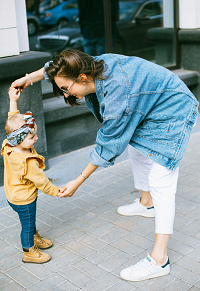There are so many philosophies on child discipline these days, it’s enough to make any parent’s head spin. While most parents have an idea of what type of disciplinarian they want to be, it can sometimes be a struggle to stick to your ideal parenting style when your discipline doesn’t seem to be working.
How to Discipline a Child Effectively
Most parents utilize a variety of child discipline methods without even knowing it. We all just want our kids to behave, right? But how?
Parents and caregivers probably use many approaches, depending on the dynamic of each family. You might recognize one or more of the following five general approaches:
Positive – focuses on praise and teaching problem-solving strategies
Gentle – humor and distraction help parents calmly redirect the child and prevent misbehavior
Boundary-based – parents set limits and consequences for kids, often providing options, which may result in natural consequences
Behavior Modification – desired behavior is rewarded while undesirable behavior is either ignored or praise/privilege is withheld
Emotional coaching – focuses on acknowledging kids’ feelings and guiding them toward making positive choices instead of acting out
Many parents share child discipline with another family member, daycare, or nanny. Unfortunately, inconsistent strategies can actually make it harder to discipline kids.
When parents or providers disagree about how to discipline a child, behavior issues can worsen. Parenting partners should communicate expectations and work together toward the common goal of good behavior.
Au Pair childcare is one way many American families are strengthening their parenting circle. An Au Pair is a contributing, responsible partner in his or her Host Family.
They provide flexible, consistent childcare and a cultural exchange experience, but that is just the beginning. Au Pairs are an extension of the parents, consistently supporting child discipline.
“She is firm, but gentle when the children are misbehaving.”
– Marlena, Host Mom
Parents who host have the added benefit of live-in help with child discipline. Host Parents can train their Au Pair to mimic their approach, including consequences, unlike other forms of childcare.
How to discipline your child in a way that strengthens your bond (instead of driving a wedge between you)
Parents and caregivers need to be aware of the difference between child discipline and punishment. Approaches to child discipline should focus on self-control and responsibility. Avoid punishment, which focuses on bad choices of the past.
The first step to effective child discipline is a positive relationship. Relationships are built on common goals and communication, in families and the Au Pair Program. In addition to helping with child discipline, an Au Pair can provide support and peace of mind, a benefit to the entire family.
“She has been helping us have more positive interactions… helping my husband, and me, and grandparents be more patient with the children.”
– Amber, Host Mom
How to discipline a toddler
Toddler behavior can be challenging, to say the least! It is the age when many parents begin to consider punishments for kids.
Simple – the K.I.S.S principle applies here – to be clear, use a few small words and avoid long explanations when approaching two and three year old humans.
Consistent – expectations and consequences should be the same each day and in different locations, as much as possible.
Positive – avoid telling toddlers they are naughty (even when it’s true); instead, bring attention to what they are doing right, but more importantly, should be doing.
Options – small children are more likely to behave when they feel some control over their lives, so give toddlers simple choices when possible.
Repeat – little ones need directions and expectations repeated many times, so be patient and say it again, slowly.
Don’t take it personal, after all, toddlers have a lot to learn when it comes to discipline! Adults in charge need to keep their emotions in check and be role models of calm voices and safe bodies.
Best way to discipline a child with special needs
Child discipline techniques for special needs children may require further adult education and effort. Parents and caregivers need to understand the child’s particular diagnosis, as well as individual challenges and preferences.
Special needs children can learn. Families and Au Pairs or other caregivers may need to help children with special needs learn to cope with frustration and peer relationships. It is vitally important to acknowledge a child’s feelings and frustrations.
Children with disabilities may also require more support to learn positive ways to interact with peers. Social skills can be taught with simple books called social stories, which help children identify other desirable options instead of the undesired behavior.
Distraction and redirection are great child discipline techniques for kids with special needs (and toddlers). This is easier for caregivers who know a child well and can predict what might set off bad behavior. Au Pairs are particularly valuable to Host Families, since they live-in and get to know the family and children very well.
Use some kind of visual schedule to help the child know what to expect each day. Children with special needs, particularly those on the Autism spectrum, often behave better without surprises or changes to their routine.
Advice for Au Pairs on child discipline
Au Pairs should always talk to their Host Parents about their parenting style and discipline policy. Ask questions about each child’s personality and any current behavioral challenges. If parents are already addressing behavior issues, Au Pairs should learn more about their approach.
Since the Au Pair Program is regulated by the US Department of State, specific guidelines must be followed by both Host Families and Au Pairs. Go Au Pair has dedicated Local Area Representatives (LARs) who regularly communicate and provide support with Au Pairs and their Host Families. Don’t be afraid to ask for help!
The following are basic guidelines for Au Pairs facing child discipline concerns:
- Never use physical punishment of any kind – child punishment is not the job of the Au Pair, who can be immediately removed from the program for using physical punishment on Host Kids.
- Try the parents’ methods for a few weeks before altering anything – if it’s working, don’t fix it. Au Pairs can add to or complement the parents’ methods without changing them completely.
- Be firm and consistent – Au Pairs are like a big sister or brother, so don’t give in to begging and whining. Use a calm, matter-of-fact voice. It’s okay to say, “No, your parents don’t allow that so neither can I.”
- Follow up with parents on what is and isn’t working, then ask for recommendations and support – do your best, accept constructive criticism, and be open to new ideas.
Some Final Advice
Remember that teaching a child discipline takes time and kids are just learning. They will make mistakes and adults need to be models of patience and mercy.
Whenever you find yourself wondering how to punish a child for bad behavior, consider taking a short break. Review the parents’ plan for each child. Plan your response to bad behavior carefully.
It is probably better to say, “Remember how much you love your room when it is all cleaned up?” rather than nag or demand. Make a fun game or contest to distract the child from arguing.
The old saying, “You catch more flies with honey than vinegar” is true for child discipline. Keep calm and briefly discuss better choices a child could make. Then move on. Angry words or actions won’t change behavior.
Never hold old offenses against a child. Instead, embrace the individual and encourage social and emotional growth. Always report serious misbehavior to Host Parents. Address safety concerns immediately. Involve the child in the conversation (after talking to the parents).
Finally, the use of rewards is a powerful child discipline technique. Rewards don’t need to cost money either. Au Pairs can reward with their time and attention, just like parents. Special activities like baking together or playing a game can be simple rewards too.
Kids will not always behave well. Hopefully, these time-tested ideas will be useful tools to help families and Au Pairs face their challenges.





